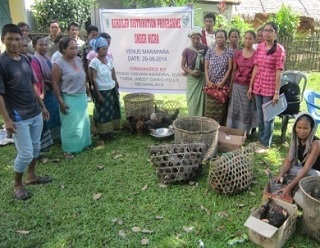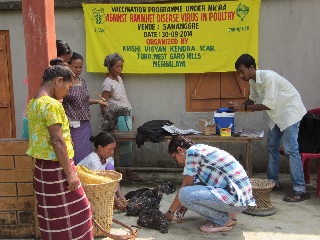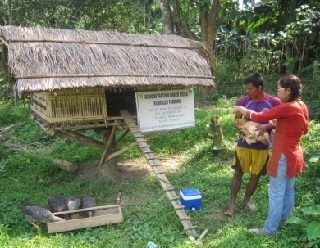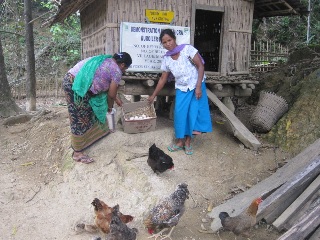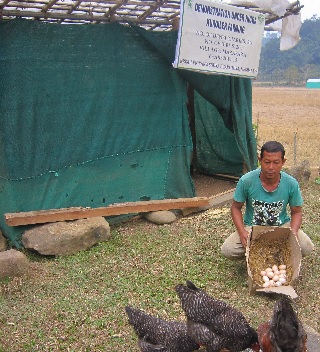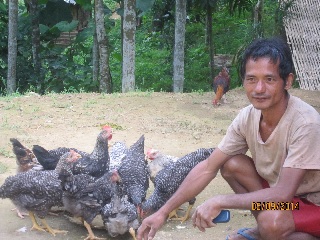Success story on Backyard Kuroiler farming by the tribal farmers in West Garo Hills district of Meghalaya
Sagarika Borah, Tanmay Samajdar, Tarun Kr Das and Greatush R. Marak KVK, ICAR, West Garo Hills, Meghalaya
Background
Egg and poultry meat production in North-East is largely dependent on backyard farming with indigenous chicken breed. The genetic potential of these local chickens for egg and meat production is very poor with annual egg production of 70 eggs per hen and low body weight. This is one of the main reasons for poor productivity of backyard farming or rural poultry farming. There is a huge gap between demand and supply. As the backyard farming is low cost and self- sustaining farming system which is least dependent on external inputs, there is only need to improve the productivity of backyard poultry by introducing suitable chicken verities having more growth rate and egg production than desi birds.
Kuroiler chickens are such type of dual purpose breed producing more eggs and meats than local birds. They are relatively resistant to various poultry diseases; thrive well on locally available feed resources and good scavengers. They are suitable for climatic condition of Garo Hills. This backyard Kuroiler farming has potentiality to bridge the protein supply gap and to improve the livelihood of the tribal farmers of the region.
KVK intervention
Two hundred sixty (260) Kuroiler birds (4-6weeks old, body wt ranges from 535g to 875g) were distributed among 26 beneficiaries (10 nos to each beneficiary) from three villages under NICRA project of KVK in the year 2014. Kuroiler birds were procured from State Poultry Farm, Rongkhon, West Garo Hills, Meghalaya. Farmers kept the birds in houses that were constructed with locally available materials, such as bamboo and wood. Brocken rice was main source of feed. KVK conducted training programmes for the farmers on all managemental aspects of kuroiler farming including disease control measures. Deworming and vaccination were done regularly by KVK personnel.
Distribution of Kuroilers
Vaccination in Kuroiler birds
Performance of Kuroiler birds at Farmer’s field
Kuroiler birds on backyard system performed well at the farmer’s field. Some of the beneficiaries succeed to get the ultimate production level of Kuroiler birds. Anthan Sangma of Marapara village managed to sale 410 eggs @Rs10 per egg in his village itself. Another farmer, Nikseng Sangma reported that he got about 600 eggs from his birds. The recorded performance of the Kuroiler birds in the villages is mentioned below.
Sl.No.
1
Body wt (4-6 weeks) 535 – 875g 2
Body wt (12 weeks)
Male
Female2.1kg
1.8kg3
Age at 1st egg 180-200 days 4
Annual egg production per hen 100-110 nos
Photographs showing Kuroilers reared by different farmers
Impact
Other farmers in the villages were motivated to start Kuroiler farming. They purchased fertile eggs from Anthan Sangma and Nikseng Sangma for natural brooding by local hen. These farmers approached KVK for vaccination in their chicks. Some farmers purchased Kuroiler chicks from State Poultry Farm, Rongkhon by their own for backyard rearing.
